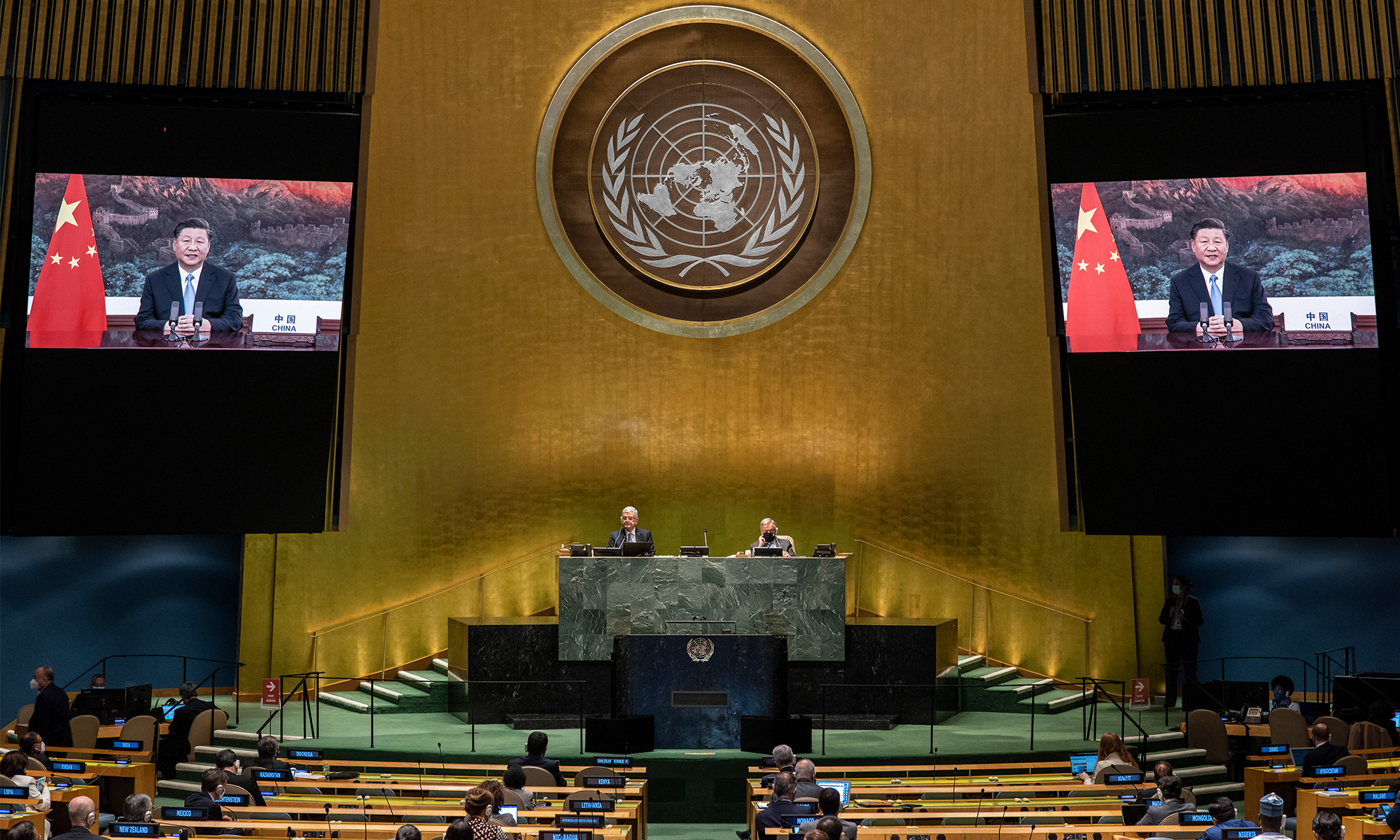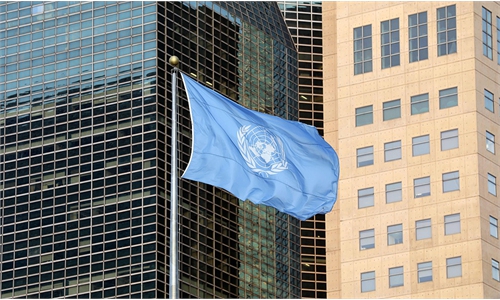Xi reaffirms COVID-19 pledges at UN assembly
Major countries should act like major countries: Chinese President

Chinese President Xi Jinping (on screen) addresses the general debate of the 75th session of the United Nations General Assembly on Tuesday via video. Photo: AFP
In stark contrast to the US who apparently turned the UN General Assembly - a multilateral dialogue platform--into a battlefield to attack and defame China, China stressed putting people and lives first in battling COVID-19, and that major countries should act like major countries by taking up their due responsibility and live up to people's expectations.
Though the Chinese president did not mention the US in his speech, unlike Donald Trump who started his speech by mentioning the "China virus," Chinese analysts described the virtual speeches as a "face off" between China and the US, in which Chinese President Xi Jinping's words and pledges were gentle but powerful, which fully displayed China's image as a responsible major country which honors commitment, respects science and stresses actions.
During the general debate, state leaders all focused on the impact of COVID-19 on the economy and health. Xi pledged that China will provide COVID-19 vaccines to developing countries on a priority basis, and will honor its commitment to provide $2 billion in international assistance over two years.
He also promised to provide another $50 million to the COVID-19 Global Humanitarian Response Plan, and establish the phase III FAO-China SSC Trust Fund with $50 million.
COVID-19 will not be the last crisis to confront humanity, so we must join hands and be prepared to meet even more global challenges, he said.
"That was a serious contrast to some US politicians who are still fighting for their political ends while ignoring people's lives," Lü Xiang, a research fellow on US studies at the Chinese Academy of Social Sciences in Beijing, told the Global Times on Tuesday.
In the speech, Trump told the United Nations General Assembly to "hold China accountable for their actions" related to the coronavirus pandemic, and accused the Chinese government and the World Health Organization (WHO), which he said is virtually controlled by China, of falsely declaring that there was no evidence of human-to-human transmission. On the same day, the US just topped 200,000 COVID-19 deaths in less than 8 months.
"It is evident that Trump has abandoned his efforts to deal with the epidemic," Lü said, slamming Trump for boasting about his achievements as being "shameless."
The US has always been self-centered while China stressed inclusiveness and a shared prosperity. Trump gave the fullest expression of the "egotism" of the US culture in his speech full of attacks and defamation against China, Wang Yiwei, director of the institute of international affairs at Renmin University of China in Beijing, told the Global Times on Tuesday.
On the contrary, China has consistently emphasized its role and responsibilities in supporting others in fighting the virus, in a humble rather than condescending way that Trump took.
While many countries were not able to denounce Trump in public, many ridiculed Trump's arrogance and his destructive power over the world alliance systems, Wang said.
Despite touting the US as the most powerful country in the world, Trump offered nothing of substance in his speech. China, the second largest contributor to the UN, continued its principle of promoting global common development by providing another two funding packages and expressing its determination to share the experience with the rest of the world, experts noted.
Xi stressed WHO's leading role in the global fight against COVID-19, and any attempt to politicize the COVID-19 pandemic or stigmatization must be rejected, which has been frequently mentioned by officials, scientists and experts from all over the world.
Trump has been sharply critical of international organizations. In May, he vowed to pull the US out of the WHO. The US has also opted out of UNESCO, and threatened to withdraw from the World Trade Organization.
Many senior Chinese officials have repeatedly criticized the US withdrawal and breach of contract as a unilateral hegemonic act on various diplomatic occasions. They slammed the US and its allies' so-called Clean Network program to bring the world back to the era of the jungle.
A matter of action
Trying to turn China into a scapegoat showed the US has brought bilateral tensions to a multilateral situation, and is determined to confront China, Zhang Guihong, director of the Center for the United Nations and International Organizations of the Institute of International Studies at Fudan University, told the Global Times on Tuesday.
But members of the UN have their independent judgment. Washington's close allies may follow suit in some areas to boycott China, but it is impossible for a majority of the 193 members to do the same, Zhang said.
Analysts pointed out that the US has already shown the tendency of trying to turn a multilateral dialogue platform into a battlefield. However, whether it is a battlefield or a window of communication mainly depends on how China deals with it.
"Considering bilateral interaction channels between China and the US are narrowing, the two countries' missions at the UN might be one of the remaining chances to seek common ground for cooperation, which is not to benefit China and the US only, but to shoulder the responsibilities as major countries, major economies for the world's sake," Zhang said.
In times of crises like the pandemic and economic stagnation, cooperation and coordination are more important than ever, analysts stressed, noting UN organizations should take a bigger role in pandemic control, vaccine development and virus tracking.
The UN is more like a platform for members to discuss problems, rather than an executive organ to address all the problems, Zhang said. "There will always be differences between UN members, but the world should work together for a more effective UN. It requires the cooperation of all members," Zhang said.
Like China, many European countries have always advocated multilateralism. Russia, as another major world power, will inject positive momentum to the world to carry out multilateralism, analysts said.
However, the power of the UN is concentrated in the UN Security Council, and the five permanent members--China, the US, the UK, France and Russia--have veto power. Once the contradictions between the five permanent countries intensify, the normal operations of the UN will be kidnapped, deadlocking many issues.
In the past, the conflicts between the US and Russia bound the UN, and now, conflicts between China and the US are also affecting the organization.
Experts pointed out that it is not a matter of how many countries declare that they uphold multilateralism, but how many countries act in line with the principle.
The US has dropped out of some international organizations, and had threatened to abandon the UN. But analysts noted it is unlikely to happen. Multilateralism and cooperation will continue to be main trend of world order, and the Trump administration, even though it shows a tendency to "quit chat groups," will face domestic pressure from political elites when it comes to quitting the UN, said Li Haidong, a professor at the Institute of International Relations of the China Foreign Affairs University.



